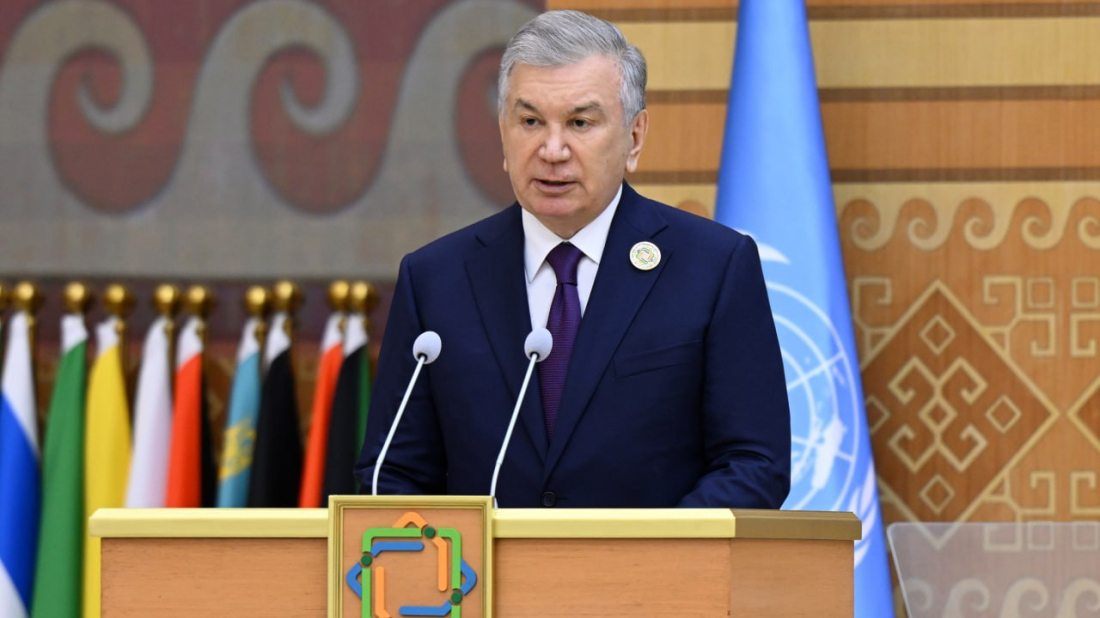Newcastle United defeat Qarabag 6–1 in Champions League play-off first leg
Aghdam’s Qarabag experienced a 6–1 defeat to England’s Newcastle United in the first leg of their UEFA Champions League play-off tie....

The President of Uzbekistan proposed developing a Global Agreement on Transit Guarantees for Landlocked Countries under the auspices of the United Nations. This initiative aims to ensure fair access to seaports and communication networks, reduce the risks associated with cargo transportation.
At the Third United Nations Conference on Landlocked Developing Countries (LLDC3), President Shavkat Mirziyoyev proposed several initiatives to address the common challenges faced by landlocked nations, including high transportation costs, limited access to global markets, and significant trade barriers.
Turkmenistan's national resort Awaza is hosting the LLDC3 conference under the theme “Driving Progress Through Partnerships”.
Uzbekistan is one of 32 landlocked developing countries worldwide, with access to maritime routes only by crossing the territories of multiple neighboring states.
"In our case, a number of challenges arise from the fact that the nearest seaports are located nearly three thousand kilometers away. These include high tariffs, limited capacity of transport corridors and infrastructure, and dependence on the customs and transit policies of other countries," President Mirziyoyev stated.
Referring to the World Bank, he added that the Central Asian region loses up to 2% of its gross domestic product (GDP) annually due to high transport costs and transit instability. Logistics costs account for up to 60% of the total cost of goods, which is several times higher than the global average.
In this regard, he emphasized that developing new, reliable transit corridors and logistics infrastructure is crucial for establishing a unified transport and logistics space in Central Asia. Today, comprehensive programs and projects are being implemented to transform Central Asia into a fully-fledged transit hub between East and West, North and South.
Uzbek leader emphasized that the development of international transport corridors and infrastructure requires coordinated and collective efforts.
Highlighting the Middle Corridor as one of the most promising transport routes, he noted that its effective utilization depends primarily on a harmonized transit policy, unified regulations, and fair container transport tariffs.
"We advocate accelerating the preparation and implementation of the Uzbekistan–Afghanistan–Pakistan railway construction project. Converging this promising corridor with the China-Kyrgyzstan-Uzbekistan railway line, which is now under construction, will open up opportunities to form a new trade and economic space, as well as sustainable transport infrastructure, in our vast region" President Shavkat Mirziyoyev stated.
The implementation of these major infrastructure projects is driving a growing demand for flexible investment instruments.
The Central Asian countries’ need for investment in transport infrastructure is estimated at nearly $40 billion per year.
In this regard, President Mirziyoyev proposed the establishment of a United Nations-backed Fund for the Promotion of Logistical Integration of Landlocked Countries, aimed at attracting resources from donor nations, international development institutions, and global programs.
To develop concrete proposals for addressing shared challenges, he urged leading experts and think tanks from landlocked countries for active engagement, with a focus on deeper integration of the countries into global production chains, the rapid advancement of artificial intelligence and digital technologies, the expansion of cross-border investment, and support for start-ups.
Uzbekistan also expressed committment to joining the International Analytical Centre for Landlocked Countries
Ruben Vardanyan has been sentenced to 20 years in prison by the Baku Military Court after being found guilty of a series of offences including war crimes, terrorism and crimes against humanity.
Canadian Prime Minister, Mark Carney, announced on 16 February that the Honourable Janice Charette has been appointed as the next Chief Trade Negotiator to the United States. She's been tasked with overseeing the upcoming review of the Canada-United States-Mexico Agreement (CUSMA).
The Pentagon has threatened to designate artificial intelligence firm Anthropic as a “supply chain risk” amid a dispute over the military use of its Claude AI model, according to a report published Monday.
Israeli airstrikes on southern Lebanon killed two people in 12 hours, Lebanon’s Health Ministry said on Tuesday.
Representatives of Ukraine, Russia and the United States are set to meet in Geneva for a third round of trilateral negotiations aimed at ending the nearly four-year war, even as both sides intensify military pressure on the ground.
Two Palestinians were killed on the first day of Ramadan after Israeli forces opened fire in the Gaza Strip, according to local sources and hospital officials.
Aghdam’s Qarabag experienced a 6–1 defeat to England’s Newcastle United in the first leg of their UEFA Champions League play-off tie.
British Steel has secured a multi-million-pound order to supply rail for a major high-speed railway in Türkiye. Backed by UK Export Finance, the deal will see 36,000 tonnes of rail used on a 599km line between Ankara and İzmir, prompting the company to resume round-the-clock production.
A new freight corridor linking China with Tajikistan via Kyrgyzstan and Uzbekistan has entered pilot operation, marking another step in Central Asia’s expanding transport connectivity.
Afghan and Uzbek traders have signed 25 agreements worth more than $300 million at a business conference, as officials from both sides said trade ties are expanding rapidly and could grow further in the coming years.
You can download the AnewZ application from Play Store and the App Store.

What is your opinion on this topic?
Leave the first comment